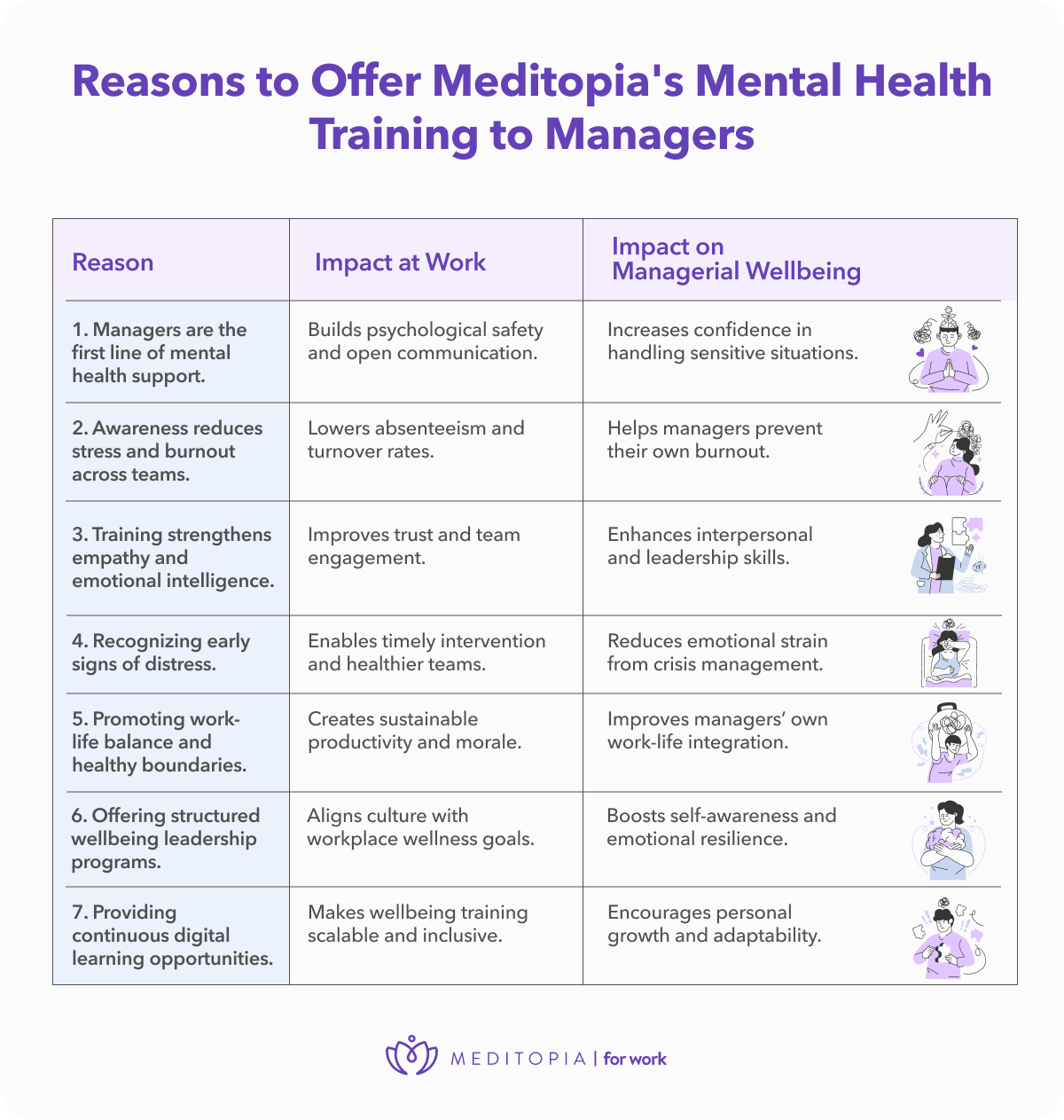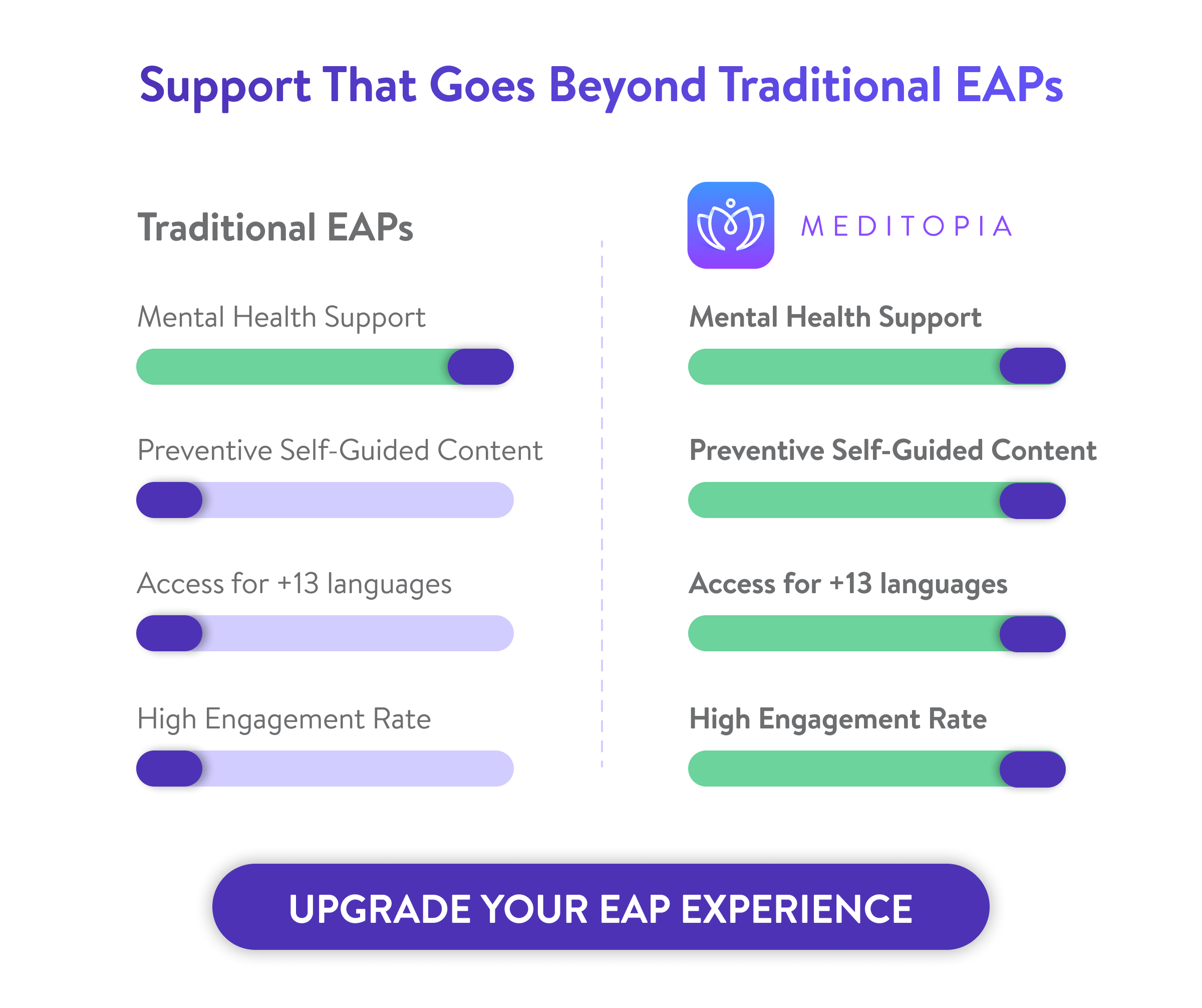A survey found that only 29 % of organisations offer line manager training in mental health, and among those, 73 % say their managers feel confident to hold sensitive discussions and signpost support [1]. Mental health training for managers is a strategic imperative; when they are trained to recognise, respond to and support mental health at work, they become powerful enablers of workplace wellness and leadership wellbeing.
Why Mental Health Training for Managers Matters
Managers are uniquely positioned as the first line of support in an organisation’s mental health ecosystem. With appropriate workplace mental health training for managers, they can help identify early signs of stress, foster safe dialogue and build resilient teams. Without this training, organisations risk overlooked distress, impaired performance and culture gaps.
- Managers also exert a major influence on employee mental wellness: one global study found that 69 % of workers say their manager has more impact on their mental health than doctors (51 %) or even therapists (41 %) [2].
- Poorly managed stress, unclear boundaries and ineffective communication can drive absenteeism, turnover and reduced morale.
- A stressed manager cascades stress downwards; calm and emotionally aware leadership promotes balance and focus [3].
- Managers who understand mental health are better at creating open, stigma-free environments for discussion and feedback.
- When every manager understands how to prevent burnout and nurture recovery, crises are managed with less disruption.
- If we consider that employees are 32% less likely to quit when their managers check in regularly about mental wellbeing [4], the importance of this type of training increases.

Core Topics Covered in Mental Health Training
So, now that you understand better the importance of wellbeing leadership training, aren't you curious about what exactly can they learn? Here are essential areas typically included in effective manager programmes:
- Recognising stress and burnout early – Empowering managers to spot physical, emotional or behavioural signs of overload before escalation.
- Having compassionate conversations about mental health – Building capacity to approach sensitive topics, reduce stigma and signpost help.
- Setting healthy team boundaries – Guiding managers to support work-life balance, hybrid or remote settings and prevent role blurring.
- Managing performance under pressure – Helping leaders balance delivery expectations with wellbeing, shifting from top-down control to supportive leadership.
- Encouraging work-life balance – Equipping managers to model healthy recovery, flexible practices and avoid chronic overwork in the hybrid workplace.
- Building psychological safety at work – Training that helps managers foster an open environment where team-members feel safe to speak up.
- Emotional intelligence at work – Enhancing self-awareness, empathy, self-regulation and that ability to positively influence team culture.
- Inclusive communication and diversity in wellbeing – Enabling leaders to address mental health across varied backgrounds, remote teams and complex environments.
- Burnout prevention for managers – A meta-topic focusing on the leaders themselves: recognising their stress, managing boundaries and sustaining personal wellbeing.
Beyond the classic topics, it is important to consider the new dynamics of the world and the emergence of technology that changes our lives. Here are some mental health trianing topics for managers that will impact the near future of corporate wellbeing:
- Navigating AI-Driven Workplace Anxiety – As automation and generative AI reshape roles, managers need to recognise and address the uncertainty, imposter feelings, and skill anxiety employees experience during digital transformation.
- Supporting Teams During Crises and Natural Disasters – From earthquakes to pandemics, training helps managers offer psychological first aid, maintain communication, and stabilise team emotions in the face of disruption. Meditopia for Work has successfully support employee wellbeing through these crises in many organizations.
- Digital Fatigue and Always-On Culture Management – Leaders learn to identify screen fatigue, enforce digital boundaries, and model healthy tech-use behaviours to protect mental recovery time.
- Building Climate Resilience and Addressing Eco-Anxiety – With climate-related stress on the rise, managers can learn how to acknowledge eco-anxiety, communicate transparently about sustainability initiatives, and help teams channel concern into constructive action. Meditopia recognizes this new challenge, and includes eco-anxiety kits and programs in our platform.
- Leading in Polarised or Uncertain Times – Training equips managers to navigate value conflicts, social tensions, or politically charged topics with empathy, inclusion, and psychological safety.
Benefits of Training Managers in Mental Health
When organisations invest in mental health awareness training for managers, the benefits ripple across individuals, teams and the business. For example, a study found that manager training is “strongly linked to better business performance” including improved recruitment and retention [5]. Let's check some other reasons you can start training your managers, too:
- Benefits For managers:
- Enhanced Emotional Intelligence at Work – Managers develop practical empathy, active listening, and emotional regulation skills that reduce conflict and improve team morale.
- Greater Confidence in Sensitive Conversations – Through role-play and guided learning, leaders learn how to address stress, burnout, or depression with tact and professionalism.
- Early Intervention Capability – Training equips managers to spot subtle behavioural or performance changes, enabling timely support before small issues escalate.
- Stress Management for Leaders – Modules on leadership wellbeing help managers manage their own mental load, preventing top-down burnout.
- Increased Trust and Credibility – Employees are more likely to disclose difficulties to leaders trained in psychological safety, reducing hidden presenteeism.
- Improved Decision-Making – Emotionally intelligent leaders make fairer, less reactive decisions — improving culture and long-term planning.
- Benefits For teams:
- Safer Communication Climate – When managers are trained in compassionate communication, employees feel safer to share struggles, ideas, or feedback.
- Higher Engagement Levels – Gallup data shows that 70% of team engagement variance depends on the manager’s behaviour [6].
- Reduced Burnout and Absenteeism – Employees led by supportive managers report fewer sick days and a lower risk of emotional exhaustion.
- Improved Hybrid Work Experience – Training helps leaders support both remote and in-office staff fairly, addressing isolation and hybrid fatigue.
- Better Collaboration and Innovation – Teams that feel psychologically safe show higher creativity and problem-solving scores in cross-functional projects.
- Inclusive Culture – When managers apply wellbeing practices equitably, minority and neurodiverse employees experience fewer barriers to participation.
- Benefits For Business:
- Lower Turnover Costs – Trained managers retain talent better by addressing emotional stressors before resignation.
- Fewer Stress-Related Claims – Awareness and documentation practices protect companies from legal and reputational risks tied to unmanaged workplace stress.
- Reduced Presenteeism – The UK’s Centre for Mental Health estimates mental ill-health costs employers about £45 billion per year [7], training mitigates a portion of that loss through early detection and prevention.
- Improved Productivity and Focus – Teams with wellbeing-oriented leadership show up to 12% higher performance and collaboration metrics [8].
- Positive Employer Branding – Companies promoting manager wellbeing programs attract top talent who prioritise inclusive, supportive environments.
- Data-Driven Insights into Wellbeing ROI – Platforms like Meditopia for Work provide dashboards to monitor participation, satisfaction, and behavioural outcomes in real time.
Traditional vs. Digital Mental Health Training
Here’s a comparison showing how the shift to a digital model supports scalability, accessibility and measurement, ideal for modern workplaces looking to deliver manager wellbeing programs cost-effectively.
How to Implement Mental Health Training for Managers
Rolling out corporate training for mental health requires embedding it into leadership practices and culture, not just subscribing to a platform. Here’s a robust framework for HR and decision-makers:
- Assess the current state; Use surveys, manager feedback, absence data and wellbeing metrics to identify gaps and prioritize topics.
- Define clear objectives: Align training outcomes with business goals: reducing absenteeism, improving retention, increasing psychological safety at work.
- Select relevant training modules: Choose topics that reflect your culture and needs (e.g., empathy-training for leaders, burnout prevention for managers, inclusive communication).
- Choose the right delivery model: Prefer digital, scalable formats (such as online leadership workshops) that support hybrid and global teams.
- Engage stakeholders: Involve senior leaders, line managers and HR champions to build buy-in and model behaviour.
- Launch and promote the programme: Communicate purpose, benefits and how the training supports manager wellbeing and team performance.
- Monitor engagement and outcomes: Track completion, feedback, changes in manager confidence and correlate with team wellbeing data.
- Embed into leadership culture: Reinforce learning with follow-up sessions, coaching, peer groups and continuous access to resources.
- Measure business impact: Link the training to metrics such as reduced sick-leave, improved retention and higher engagement.
- Iterate and scale: Use insights to refine content and delivery, expand to new cohorts, and sustain the momentum of the training.
Meditopia for Work can do all this for you. Everything from benefits communication to increase engagement, create corporate gamified challenges for wellbeing, measure the impact of the programs, provide personalized guides for specific organizational challenges, and more. Contact us to get a free demo today!
Example Topics from Meditopia’s Online Trainings
Below are sample training themes offered by Meditopia’s online platform, designed to align with digital manager development, online leadership workshops, leadership wellbeing and team-centric outcomes:
- Leadership & Empathy in Action: Deep-dive modules where managers build trust and emotional intelligence at work through real case-scenarios and role-play.
- Wellbeing at Work: Preventing Burnout for Managers and Their Teams: Focused on burnout prevention for managers, spotting early signs, establishing recovery rituals and sustaining resilience for hybrid/hybrid-remote teams.
- Inclusive Communication & Psychological Safety: Training to help managers foster psychological safety at work, handling diverse teams, remote dynamics, mental health stigma and inclusive wellbeing leadership.
- Soft Skills Development for High-Impact Leaders: Modules on active listening, feedback techniques, emotional agility under pressure, navigating change and building team wellbeing mindsets.
- Data-Driven Insights for Manager Wellbeing Programs: Teaching managers and HR how to use analytics and dashboards to track manager wellbeing programmes, measure impact and link the learning to business outcomes.

Measuring the ROI of Manager Mental Health Training
To build the business case for manager wellbeing programs, track both quantitative and qualitative outcomes:
- Increased engagement and retention – Research shows training line managers in mental health is associated with improved recruitment, retention and business performance.
- Fewer sick leaves and absenteeism – Globally, 12 billion working days are lost every year due to depression and anxiety [9].
- Improved employee satisfaction – Organisations with strong mental health cultures report higher satisfaction and lower turnover [10].
- Skill progress via analytics – Digital formats allow you to measure completion rates, confidence scores, behaviour change in managers and link to team wellbeing metrics.
- Cost-savings and productivity gains – Studies also indicate wellbeing interventions can yield significant ROI through reduced presenteeism and improved performance.
With Meditopia's Employer Dashboard, you get to anonymously track the progress and engagement of your team for preventive measures.
























